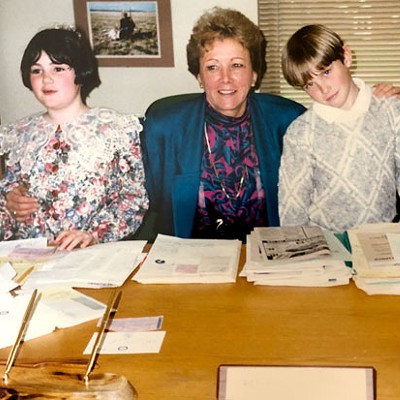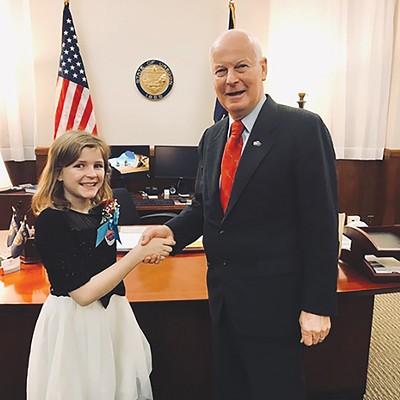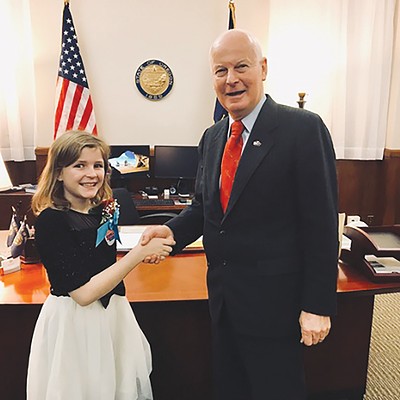With Oregon's general elections about 100 days away, gubernatorial candidate Rep. Dennis Richardson recently stopped by our offices to talk about his reasons for running for governor, economic development and his stand on social issues.
A graduate of Brigham Young University's law school and a trial lawyer for more than 30 years, Richardson also has served as a State Representative since 2002, and was elected unanimously during his second term to the lofty position of Speaker Pro Tem. In this May's primary for the Republican candidacy for governor, Richardson gathered a solid 65 percent of the vote.
A Mormon, Richardson has often and publicly espoused a conservative stance on matters such as abortion and same-sex marriage, viewpoints that have returned to haunt him during his recent campaign. In our interview, he addresses those topics.
The two candidates have met already for one debate and, just before press time, the Richardson camp agreed to five debates with Governor John Kitzhaber, but no specific dates or locations have yet been set.
Source Weekly: What do you perceive as your most likely demographic?
Dennis Richardson: [The] most likely is men aged 45 and over.
SW: Why do you feel like you synch with that group?
DR: Because I feel like I represent the values that made this state great. Oregon has been a national leader over so many things over the years. Thirty years ago, we were third in the nation for education. Now we're 49th, next to last, for graduation rates. Older people are more in tune with that because they have something to gauge it against. The younger generation just have become used to it.
SW: As long as we're talking about history, some reflections on recent governors. Any thoughts over the past week about Vic Atiyeh?
DR: I'm so sorry for the loss. He was my endorser. He recently said, "Dennis, I'm tired of being called the last Republican governor [of Oregon]." His example of leadership is one John Kitzhaber should have followed. He was out trying to expand the marketplace, while John Kitzhaber has spent more time in Bhutan trying to learn about Gross National Happiness. We need a governor who is an ambassador to other countries and other states.
SW: What about Tom McCall?
DR: Great guy, had some idiosyncrasies, but not shy.
SW: Any recent Democratic governors you find values in?
DR: Every governor has things they do well. For example, [Gov. Ted] Kulongoski had a really great approach to nominations to the bench. He would get input from lawyers and other judges about who really has the skill set. Our current governor has a person on his staff and doesn't make those evaluations. I will implement the Kulongoski model. You listen to resources that have knowledge, not just promote a philosophical bent.
SW: I understand you are differentiating yourself from Gov. Kitzhaber, but what do you find best about his leadership style or policies?
DR: [About a 10 second pause] I think that John has good ideas, but he acts like an ER doctor, like he was; in other words, he triages. His leadership style is not about following up to make sure the patient recovers and is in good health.
SW: Switching gears. Where do you see the tax base being able to improve, what industries as governor would you encourage and what policies would you use?
DR: Every region has its own area that can expand. In Central Oregon, I think that the aviation industry, manned and unmanned, can be promoted; part of that is manufacturing. We need to promote manufacturing in Oregon because that is a base for skilled and middle-class jobs. You help remove barriers so that they can progress, and help find markets. I really feel like the governor is an ambassador for the state. Look what Rick Perry is doing for Texas. He is going into California with billboards everywhere saying, 'Had enough of this, come to Texas,' and businesses are flocking there.
SW: Where is your primary financial support coming from?
DR: One of the things my opponent is using against me is that I can't raise money. He has raised $1.4 million. I have 1,450 donors. Businesses are contributing more to Kitzhaber. I didn't spend any money in the primaries. There are certain groups I won't accept money from.
SW: Can you name three groups you won't accept money from?
DR: No. I don't want to pick a fight, but Planned Parenthood is endorsing Kitzhaber based on an op-ed I wrote in 1990. I had forgotten about this thing. Let's say it is unlikely that money would be coming [from them], and there are other organizations that are trying to vilify me as something I'm not. I'm about doing what is best for the state, and not about what is the polling saying we should be doing.
SW: Interesting. What is your stance on religious exemptions, like those allowed by the Hobby Lobby case?
DR: First, let me point out something that is often overlooked. I've been a legislator. I've been elected to represent a district. I believe I've done as good as I possibly can to represent my district for the past 11 years. I will do everything in my power to represent the state, meaning all of the people in the state. Well, Kitzhaber doesn't. He didn't run in 2010, and say, 'By the way, I don't believe in capital punishment, and changed my mind since the last time I was governor when I executed people.' He should have said that. Instead, he gets into office and he has two people on death row, mass murderers, vicious people, who want to be executed, and Kitzhaber . . . is just going to let them languish. In my opinion, it is breaking his oath to uphold the laws based on his personal preference. I think when you're governor you give up personal preferences because you have taken any oath to represent the people.
SW: Let's talk about three interesting issues: Recreational marijuana, same-sex marriage and GMO labeling.
DR: Marijuana: I would prefer that we wait a year until we get involved with this. Why should we dive into a deep end without knowing what is beneath it? Let's learn from what Washington and Colorado deal with, and then formulate our law. I don't think it is in our best interest as a society to legalize it. But I will fully implement the laws passed by the state.
SW: One of the arguments raised, and coming to fruition in Washington and Colorado, is the amount of tax revenue raised.
DR: If we legalized marijuana, it is going to be taxed. It will be another in a long line of sin taxes—beer, tobacco, lottery. It is not a good way to fund a government. I foretell that the marijuana industry in five years will be a major funder of elections and a major player in donating to campaigns, and that is going to be a mixed blessing at best.
SW: Marriage equality?
DR: What people do is their own business. I'm a strong supporter of marriage. I've been married 41 years, and I know the benefits of marriage for the rising generation. History has shown that traditional marriage has the best outcomes for the health and education for the rising generation. It is already determined that it is the law, and it is constitutional. When I take an oath, I am the one who will help ensure it is protected and enforced.
SW: GMO labeling?
DR: GMO is an issue that has a tremendous amount of passion. I think we need to focus on what is the science. Those in favor of GMO are pointing to the production, and feeding millions around the world, and that is not to be taken lightly. On the other hand, I'm worried about affecting the health of people. The state is the proper place to make the determination because it can afford to bring in unbiased, accurate science to determine what should be a state-wide policy, and then the governor needs to promote what is best for the state, not just based on emotions.
SW: If the election is not about your positions on issues, what three qualities should someone running for governor have?
DR: The people want integrity, and they want to trust the person. They want someone who will be transparent and open. Kitzhaber should have admitted right up front that he messed up with Cover Oregon, but instead he is blaming Oracle. Character counts. Knowledge and ability. What word would apply to that? Someone who knows how things are done.
SW: Wisdom?
DR: But it is hard for me to say I'm wise—besides having five teenage girls, you gain some.
SW: Thank you for your time.































